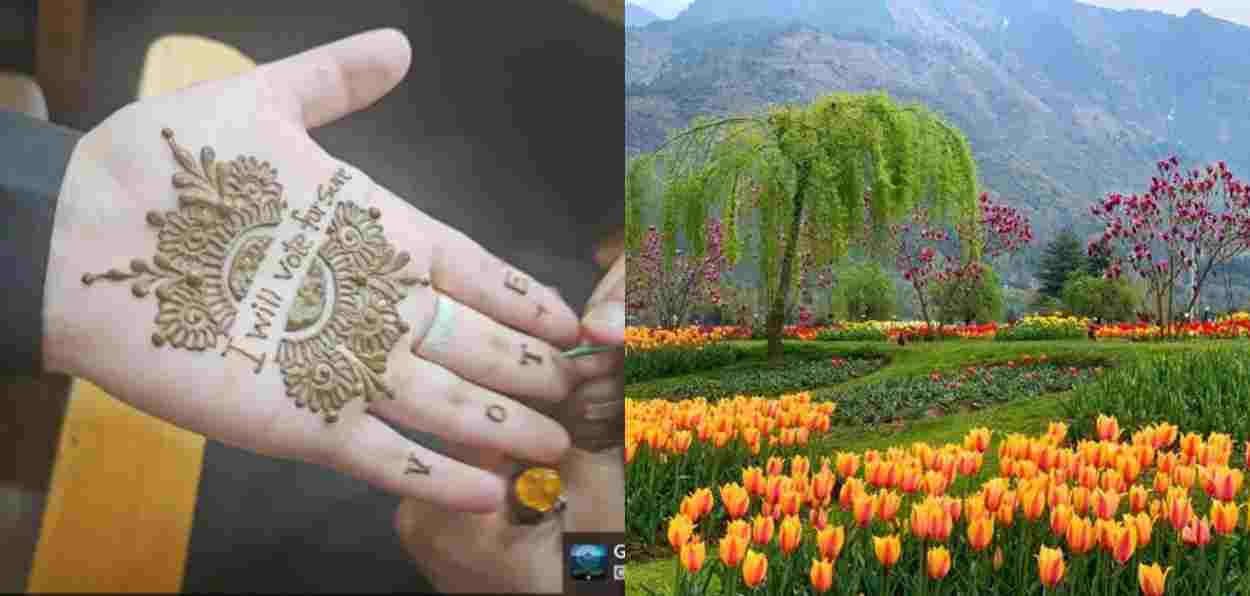
Ahmed Ali Fayyaz/Srinagar
Kashmir is passing through an interesting season: Politicians of all hues are campaigning for the Lok Sabha elections; most Kashmiri are fasting for the month of Ramzan and looking forward to Eid-ul-Fitr; people in hordes are soaking themselves in the spring blooms at the Badamwari and Tulip Garden in Srinagar and markets are picking up with early birds busy shopping for Eid.
Tourism officials claim more than 8,000 people visit Badamwari – an orchard of almonds with resplendent pink bloom akin to Cherry Blossom of Northeast and famously Japan, each day. Commissioner-Secretary Floriculture Sheikh Fayaz Ahmad told Awaz-The Voice that 10,000 to 15,000 people visit the Tulip Garden in Srinagar’s Zabarwan foothills daily.
“Last year, 3.77 lakh people visited the Tulip Garden. This year we are expecting over 4 lakh visitors”. Both the almond and Tupil blooms are short-lived hence the rush.
Senior Superintendent of Traffic Police, Srinagar, Muzaffar Ahmad Shah, and his team are grappling with the season’s unprecedented rush on the Boulevard that leads to both the gardens. On his request, the Department of Floriculture is arranging a larger parking for vehicles.
Kashmiri women Mehdi artists appeals for all to vote
Someone rather imaginatively used the trend of applying henna on the hands of women on joyous occasions like weddings, festivals, and Eid, to spread the message that everyone must vote in the coming election. The NSS (National Social service) cadets participated in it.
Participants made designs from henna tubes on their hands and on art paper in the style of henna artists to make a point. He said the competition was part of the nationwide Systematic Voters' Education and Electoral Participation (SVEEP) and was sponsored by the Election Commission of India.
Dr. Bilal, who is Deputy Commissioner of Srinagar, said the competition was held to demonstrate the traditional art form of henna application “to convey the significance of participating in the democratic process”.
Another design in henna
Dr Bilal applauded the women students who transformed fingertips into miniature canvases on voter education. He said that with elaborate designs ranging from symbols of democracy to reminders of electoral responsibilities, each henna design served as a colorful reminder of the power of the vote.
Aisha Khan, a participant, said, “Using henna as a medium to promote voter awareness is both innovative and effective. It's a fantastic way to engage with people, especially the younger generation, who probably could not be reached through conventional mediums”.
The tradition of applying Heena on auspicious occasions like Weddings has reached a crazy tip in Kashmir due to the influence of the outside and fashion industry.
A woman clicking pictures at Tulip Garden, Srinagar
“Some of its expensive designs and forms are still restricted to our elite, who pay anything between Rs 4,000 and Rs 20,000 per service, but over 90 percent of its forms are affordable for the upper and lower middle class. Some customers get it done even for Rs 200”, said Shehla, a student at the National Institute of Fashion Technology in Srinagar.
According to Shehla, “not less than 10,000 Kashmiri women”, in addition to hundreds from outside (different Indian States), who include males, are regular practitioners and service providers of henna application in Kashmir. They remain jobless for four months of winter but make a brisk business during the seasons of marriages and religious festivals like Eid-ul-Fitr and Eid-ul-Azha.“It all depends upon their professional and marketing skills, business investment, location of the parlour, and financial background of their clients”, said Ulfat, another practitioner who has returned with a degree from Mumbai. “Some of them earn lakhs (of Rupees) every month”, she added.
Since the militants had banned all fashion and beauty businesses, most such businesses functioned secretly for 20-25 years.
Badamwari (From X)
At least one parlour worker was fired upon at Gonikhan in Srinagar. Two years ago, a young girl working at a henna center in the Nowhatta area of Srinagar, was subjected to an acid attack. The incident spread fear, even as the reason was different—the young woman’s refusal to marry the assailant.
Business insiders say the business hubs of henna application in Srinagar are around Jamia Masjid and Nowhatta, in downtown Srinagar.Many artists prefer not to reveal their names, but they have a flourishing business. They have thousands of followers on their Instagram and Facebook pages and use social media to increase their business.
Sana of Baghat Barzalla, an engineer, has a flourishing business of henna applications that she runs on Instagram. Her bridal henna application packages at ‘Mehandi By Sana’ start from Rs 7,000.
ALSO READ : POK seething with public anger; Islamabad obsessed with Kashmir
‘Mehndi By Azmat’, ‘Mehandi By Saba’, ‘Mehandi By Zara’, ‘Mehandi By Iftisam’, ‘Mehandi Artist Afshana’, ‘Mehandi By Izat’ and scores of others, mostly run by well-educated young women who had no knowledge of the beauty business and started it as a hobby, are charging incredibly high rates for bridal and festival packages. They run their business through Instagram and several e-commerce platforms.
